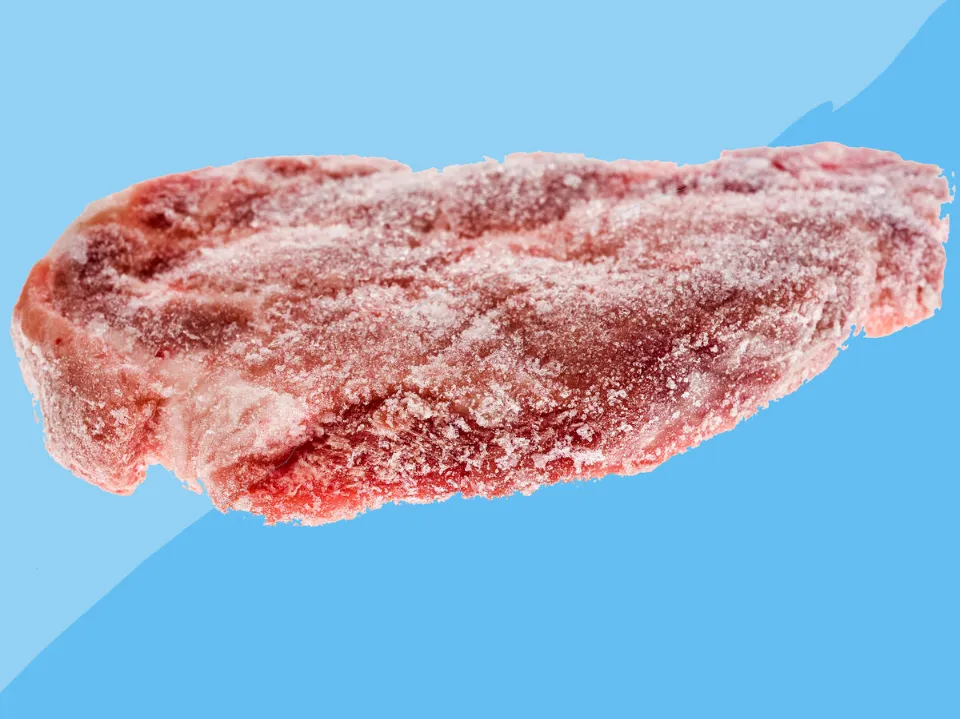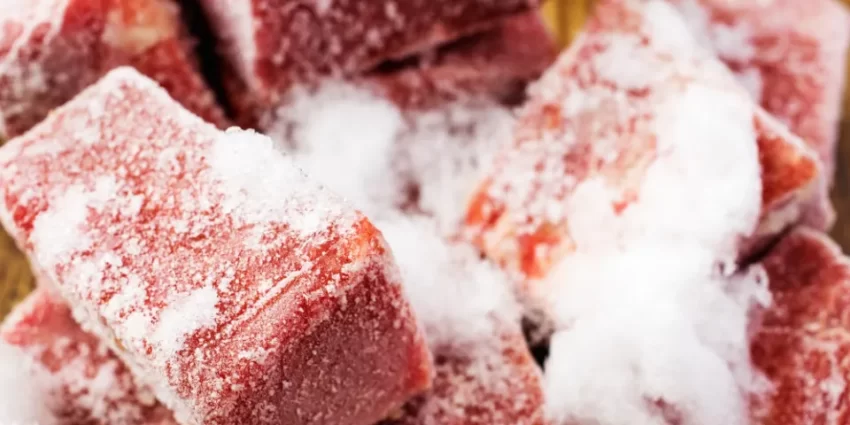How often do you find “hidden treasures” in your freezer? When you take the food out of the refrigerator, you discover that it has been freezer-burned. So, will freezer burned food make you sick?
Although freezing food is a fantastic way to keep it fresh for a long time, it cannot guarantee that your food will always be at its best. Freezer burn doesn’t make food unsafe, but rather it makes it dry in spots which is a quality issue not food safety issue.
The safety of freezer-burned food is explained here, along with some tips for preventing it.
Table of Contents
What is Freezer Burn?
Freezer burn can occur when there is moisture lost from frozen food. All foods contain water, which when frozen creates ice crystals and dehydrates us. Under a thick layer of ice crystals, the dehydration causes the food to become tough and dry.
Simply put, freezer burn is the process where water inside the cells of food—could be meat, vegetables, pizza, bread, etc.—evaporates and dehydrates portions of the food. Typically, this takes place from the surface inward.
People will typically find it difficult to stomach the off flavors and textures that result from freezer burn.
Will Freezer-burned Food Make You Sick?
Freezer burn occurs when food loses moisture while being stored there. Moisture loss occurs to all frozen food, but it can be minimized if the food is properly packaged and wrapped to keep out as much air as possible.
Moisture leaks out as air enters, giving the surface that frosted and discolored appearance. And though freezer-burned food doesn’t look appealing, it’s perfectly safe to consume.
When to Use Food With Freezer Burn?

If you intend to thoroughly cook the food and it only has minor freezer burn, defrost it properly and proceed with your intended use.
You can cut these parts away before cooking if some areas have more severe freezer burn than others. The food will nevertheless still be safe to eat if freezer burn is the only issue.
What Can You Freeze?
Almost any food can be frozen, with the exception of canned goods and raw eggs. You can freeze food that has been taken out of the can, like ham.
That said, just because you can freeze a food, doesn’t mean you’ll like how it tastes after it’s defrosted. After being frozen, some foods, like lettuce, mayonnaise, and cream sauces, change in texture and suddenly taste bad.
Because cooked meat and poultry lose moisture during cooking, the quality of frozen meat and poultry is preserved longer when they are raw.
Can Freezing Food Kill Bacteria?
The idea that freezing eliminates microorganisms like bacteria, mold, and yeast is a common one. These microorganisms are simply rendered inactive by freezing, and once the food is thawed, they can reawaken and multiply to harmful levels if the right circumstances are met.
For this reason, care should be taken when handling any thawed food. It should be prepared to the proper minimum internal cooking temperature and handled carefully to avoid cross-contamination.
How to Prevent Freezer Burn?
Luckily, there are ways you can fight back against freezer burn:
- Keep your freezer freezing: According to Matijevich, a freezer should have a temperature of 0°F or lower to operate optimally. Water freezes into much smaller crystals at that temperature. Less water has a chance to evaporate, which results in less cell damage. Additionally, using a premium vacuum bag and a very low temperature will yield the best results. Food can be preserved for a longer period of time by freezing, but the process must be carefully followed.
- Wrap foods well: Make sure your meat and other soon-to-be-frozen items are properly wrapped because air introduces freezer burn, which can lead to food poisoning. Meat and poultry can be kept in the freezer in their original packaging, according to the USDA’s Food Safety and Inspection Service, but because the packaging is permeable to air, the protection may deteriorate over time.
- Stop freezing too soon: Are you freezing things too quickly? In addition to potentially damaging the container it’s being stored in, the stark contrast between boiling-hot soup and your freezer may also be to blame for freezer burn. “Due to the potential for a brief thaw on the surface of your items, freezer burn is unquestionably likely to occur. Always make sure to thoroughly chill your items in an ice bath or, at the very least, the fridge.
- Keep track of your frozen food: It’s important to pay attention to how long your various foods have been in the freezer because freezer burn is more likely to occur the longer a food has been frozen. Especially if you’re buying in bulk, make sure your foods are labeled and organized.
- Don’t overload the freezer: When the freezer is overloaded, especially when several non-frozen items are added at once, the appliance may be put under too much stress, which could cause a slow freeze and increase the risk of freezer burn.
Final Words on Will Freezer-burned Food Make You Sick
Food will change in flavor and color as a result of the oxygen introduced by evaporation, especially meats and other poorly packaged items. However, other foods can also be harmed. A food’s likelihood of developing freezer burn increases the longer it is stored in the freezer.
One of the best ways to prevent freezer burn is to wrap food, particularly meat, as tightly as you can. Ensure that everything is completely enclosed in the smallest container or storage bag that can be sealed.
Read More:
FAQs
What Happens If You Eat Freezer Burned Food?
Freezer burn is just dehydration that happens when your frozen foods are exposed to air, and any eccentricities that you might notice in color or texture aren’t actually dangerous to your health.
How to Get Rid of Freezer Burn Taste?
Cooking a soup or making a stew is the perfect way to mask that freezer burned taste.
Can You Get Sick from Freezer Burned Ice Cream?
Freezer burned ice cream is completely safe to eat. Ice cream that has been frozen burned only affects taste and texture, so there are no safety concerns with regard to the food.

